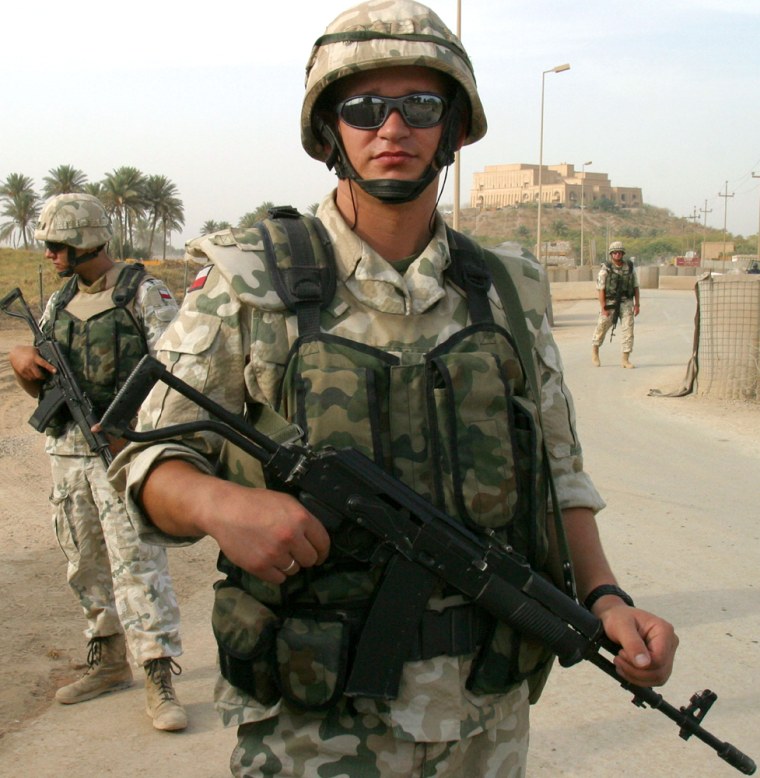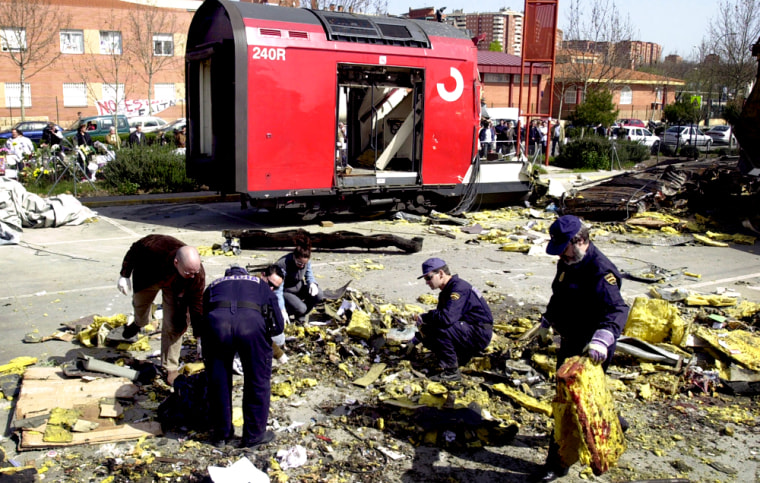The concussions of the “shock and awe” campaign that opened the Iraq war last March faded long ago, but a new wave of aftershocks is spreading across Europe and rekindling a debate that had fallen dormant: Was the removal of Iraq’s dictator worth a drop of European blood?
The answer from a rattled Spanish electorate this week is a resounding “No.” Even if the perpetrators of the March 11 train bombings have absolutely no connection to Saddam Hussein, the overturning of Spain’s pro-American government in the wake of an attack that killed 200 people is sending chills up the spines of the rest of the “coalition of the willing.”
“This is the first time I’ve ever seen an actual terrorist attack specifically timed for an election in another country and dictate a nation’s foreign policy,” says Steven Emerson, a noted terrorism specialist and author of American Jihad: The Terrorists Living Among Us. “It’s an incredible feat for al-Qaida or whatever group carried it out.”
Axis of anxious
The devastation wrought by the bombings -- the worst act of terrorism in European history –- helped topple a Spanish government that had been seen as a certain victor in the March 14 general elections. Instead, the Popular Party, which had ruled for eight years, lost in a landslide to the Socialist Party, which stood fervently against the Iraq war and has since promised to pull out Spain’s 1,300-strong contingent unless the United Nations is put in charge by June.

“You can’t organize a war by lies,” Prime Minister-elect Luis Rodríguez Zapatero told reporters, referring to the fact that the main reason given for going to war -- Iraq's weapons of mass destruction -- apparently did not exist. Basking in the global spotlight, Zapatero also suggested that George W. Bush faces a fate similar to that of Spain's Popular Party in his November reelection bid.
While the loss of a Spanish battalion will not degrade the Iraq coalition’s military capabilities significantly, the angry backlash voters directed at their government following the bombings is being viewed as a shot across the bow of other coalition leaders.
“There is no question that the so-called 'coalition of the willing' is now a lot less willing than it was before March 11,” says Simon Serfaty, director of the Europe Program at the Center for Strategic and International Studies in Washington. “It’s not only because Spain has dropped out, but because other states are now saying, ‘Hey, there is a price to pay for backing this thing and, frankly, no reward’.”
Casualties, contracts and visas
There never was much enthusiasm among the general public in Europe for toppling Saddam Hussein. Europeans tend to view America’s willingness to ignore the United Nations as proof that the superpower insists on enforcing rules that it will not abide by itself.
Add to this a tendency to view the Iraq conflict as a Bush family vendetta, plus widely subscribed to conspiracy theories about oil and Zionist treachery, and you have a a very poor foundation for transatlantic cooperation.
Yet many of Europe’s governments did sign on, in part, at least, to prevent the disagreement over Iraq from morphing into a permanent, bitter split in the western alliance. Each country had its own logic:
- Denmark and the Netherlands, for instance, tend to resent anything that seems like a “diktat" from the European Union’s continental giants, Germany and France.
- Spain and Italy were ruled by conservative governments (and Italy still is) sympathetic to the idea propagated by some in the Bush administration that the West is locked in a larger war pitting the Judeo-Christian world against resurgent Islam. Along with Poland, these two gambled that allying with Washington would win them a greater voice in internal EU issues, as well.
- Poland, along with Romania, Bulgaria, the Czech Republic, Hungary and Ukraine, still feel deeply grateful for Washington’s role in rolling back communism. Additionally, all of them are about to join the EU in May, and regard Washington, not Brussels, as the only realistic guarantee against trouble from the East should Russia turn belligerent again.
“Of all the Europeans, really, only (British Prime Minister) Tony Blair backed Bush out of personal conviction,” argues Charles Kupchan, professor of international affairs at Georgetown University. “The others did so largely because they were worried about the ‘end of the Atlantic alliance’.”
Targets of opportunity
In the wake of the Madrid attacks, these pro-American governments now face a grim reality: should al-Qaida or any related offshoot commit murder on its territory, the political fallout may well sweep them away.
“What truly worries me is their ability to choose their date,” says Serfaty of CSIS. “The attackers determined that March 11 was a good date. If they can pick their date, then we are left with the notion that there’s an agenda for this year. What’s next? The NATO summit in Istanbul? The opening ceremony of Olympic track-and-field events in Athens? The D-Day anniversary in June? You have to wonder who’s next?”
Blair and other British officials repeatedly have said publicly that they worry about being singled out for attack. Britain, by far the most vocal and militarily capable of the nations that backed Bush, would seem an obvious target.
Yet some officials caution that expecting al-Qaida to do what is logical would be to misread its history.
“Yes, they masterfully manipulated the emotions of Spain and put in place a government that will be a whole lot less likely to be a problem for them,” says a U.S. intelligence official, requesting anonymity. “But there may be a backlash to the backlash, too, in the sense that other nations will react very differently, more the way we’ve seen the British or Israelis or America after Sept. 11 react. That means they rally around the flag.”
Not just allies
Indeed, Rick Francona, a former U.S. military intelligence official who is now an MSNBC military analyst, notes that France, and not any of the Iraq coalition partners, may well be the country al-Qaida would most like to hit.
French special operations forces have been combing Afghan-Pakistani frontier areas with American commandos and, according to the country’s senior military officer, have been close to bin Laden on several occasions.
France’s history of intervening in North African politics, covertly or overtly, is remembered bitterly by Islamic militants – most recently in the early 1990s, when Paris helped convince the Algerian government to annul an election that was about to put an Islamic party in power. The resulting civil war killed over 100,000 people.
Most importantly, the French recently took the radical step of banning Islamic headscarves in its public schools, part of an ongoing culture war playing out in France as in no other nation.
European influence
The Spanish attack and its political fallout also deal a blow to Bush administration’s efforts to influence the way the European Union is evolving, and by association, the way Europe interacts with the United States on major foreign policy issues.
Not coincidentally, Spain and Poland were the two nations that held out for a larger share of the EU’s proportional voting power when the Europe tried and failed to finalize a new constitution last December.

The failure to seal a deal on the rules that will govern the larger EU that will emerge after expansion in June caused barely concealed glee in Washington.
Already, Spain’s new government is making it clear that it will relent on the EU voting issue. Those who sided with Washington fear being isolated.
“Poland is especially afraid of the EU being a kind of antagonistic superpower as far as the United States is concerned,” says Andrzej Bryk, a professor of American Studies at Jagiellonian University in Krakow, Poland. “We’re trying desperately somehow to show France and Germany we’re not interested in that direction. We need to know how the United States fits into the EU equation.”
The Polish government already had been straining to explain to its electorate the benefits of standing by America, even though no major Iraq reconstruction contracts went to Polish firms and new visa rules instituted by the U.S. Homeland Security Department on Jan. 1 lumped Poles in with the vast majority of the world when it comes to visa regulations.
To add insult to injury, Spain was supposed to take control of the central district of Iraq in June -- the district currently being commanded by Polish officers.
"It's going to be hard to argue that Poland hasn't gambled and lost," says a Polish diplomat in Washington. "We took casualties and we lost a lot of political points in Europe, and for what? We can't even enter America without a visa."
